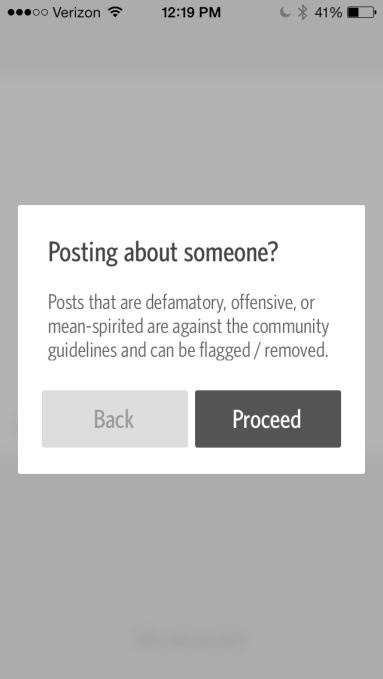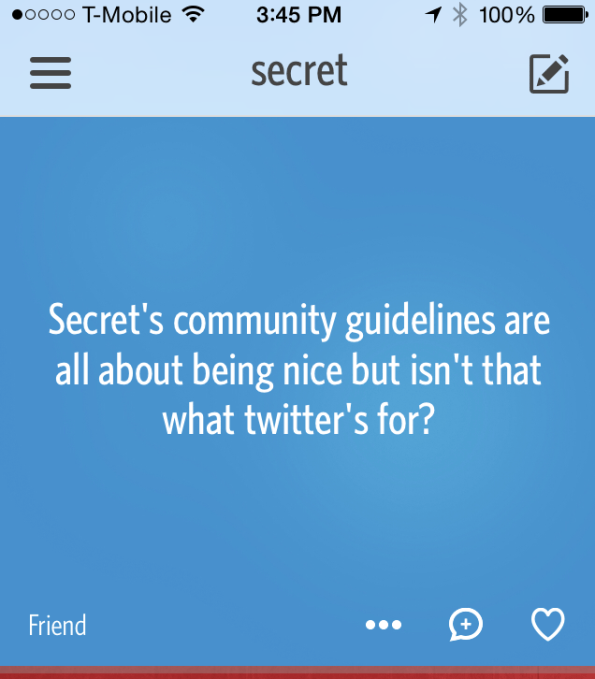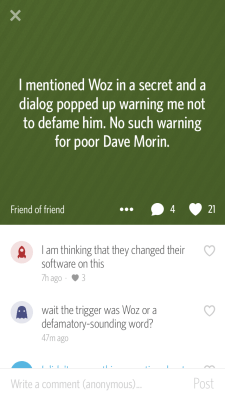It seems that school children are not the only ones who aren’t able to handle the power of anonymous social applications appropriately. Secret, the San Francisco-based (and now, newly funded) confessional app, has begun warning users to not “defame” others when posting on its service. The message appears in some cases after Secret detects a name in a post.
Several members of TechCrunch have seen posts on Secret about the new warning message, and one admits to having their own post flagged in this way.
Secret co-founder David Byttow confirmed the basics of how this warning system works, saying that, “when we detect a first name, we display a reminder and point to our community guidelines before the user can post.” He also added that “this is just a first step,” hinting that other community management mechanisms may be in the works.
A company representative also noted that using Secret to post malicious or personal attacks is a clear violation of its community guidelines, so in the update that rolled out at SXSW this year, it added this new reminder feature, which “pops up occasionally to remind the poster of the rules.”
 The move to (lightly) police the content appearing on Secret comes at a time when a number of public figures in the tech industry have seen their names appear on the network, often with some not-so-friendly commentary attached. For some, Secret has given users an outlet to speak their mind about what so-and-so is really like, without being associated with their remarks.
The move to (lightly) police the content appearing on Secret comes at a time when a number of public figures in the tech industry have seen their names appear on the network, often with some not-so-friendly commentary attached. For some, Secret has given users an outlet to speak their mind about what so-and-so is really like, without being associated with their remarks.
Arguably, there could be a small nugget of value in a few of these comments, when handled in a certain way. For instance, Secrets about what it’s like to work for someone that only focused on their management style and expectations, could help another person decide whether or not to accept a job offer, perhaps. Others could help new startup founders choose or avoid particular VCs, maybe.
Of course, it’s still a bit of a stretch to say that this type of communication needs to be shared on a public platform like Secret, where anyone can join and post, and statements can’t be verified.
And the above examples are the “kindest” ones we could dig up. More often than not, when someone’s name is brought up on Secret, the commentary gets downright seedy, ranging from details regarding their sexual preferences to outright name-calling. (One public figure is routinely called the b-word, for example.)
 It’s good that Secret is now gently reminding users that its community does have guidelines, and, yes, someone is watching what you say. And it’s possible now with the additional funding, Secret will be able even bring on a community moderator or two, as well.
It’s good that Secret is now gently reminding users that its community does have guidelines, and, yes, someone is watching what you say. And it’s possible now with the additional funding, Secret will be able even bring on a community moderator or two, as well.
Anonymity Breeds Trolls?
Anonymous social apps will all have to face the problem of unwanted content and trolling, both inadvertent and intentional, that comes with operating in this space. Secret’s competitor Whisper, for example, handles those posting thoughts about self-harm by allowing the post to go through, but not displaying it to the rest of the user base, while directing the poster to resources where they can get help. Meanwhile, recent teenage fav Yik Yak just yesterday blocked nearly all middle and high school students from even using its service, by way of geo-fences.
Secret, for now, is taking a lighter approach. After all, juicy Silicon Valley gossip is why the app is so addictive – at least for those in this tech industry bubble. Likely, the company doesn’t want to clamp down too much, and overly sanitize the service.
That being said, I think some of us would be open to there being an “NSFW” category, though. I mean really you guys, just wow.
